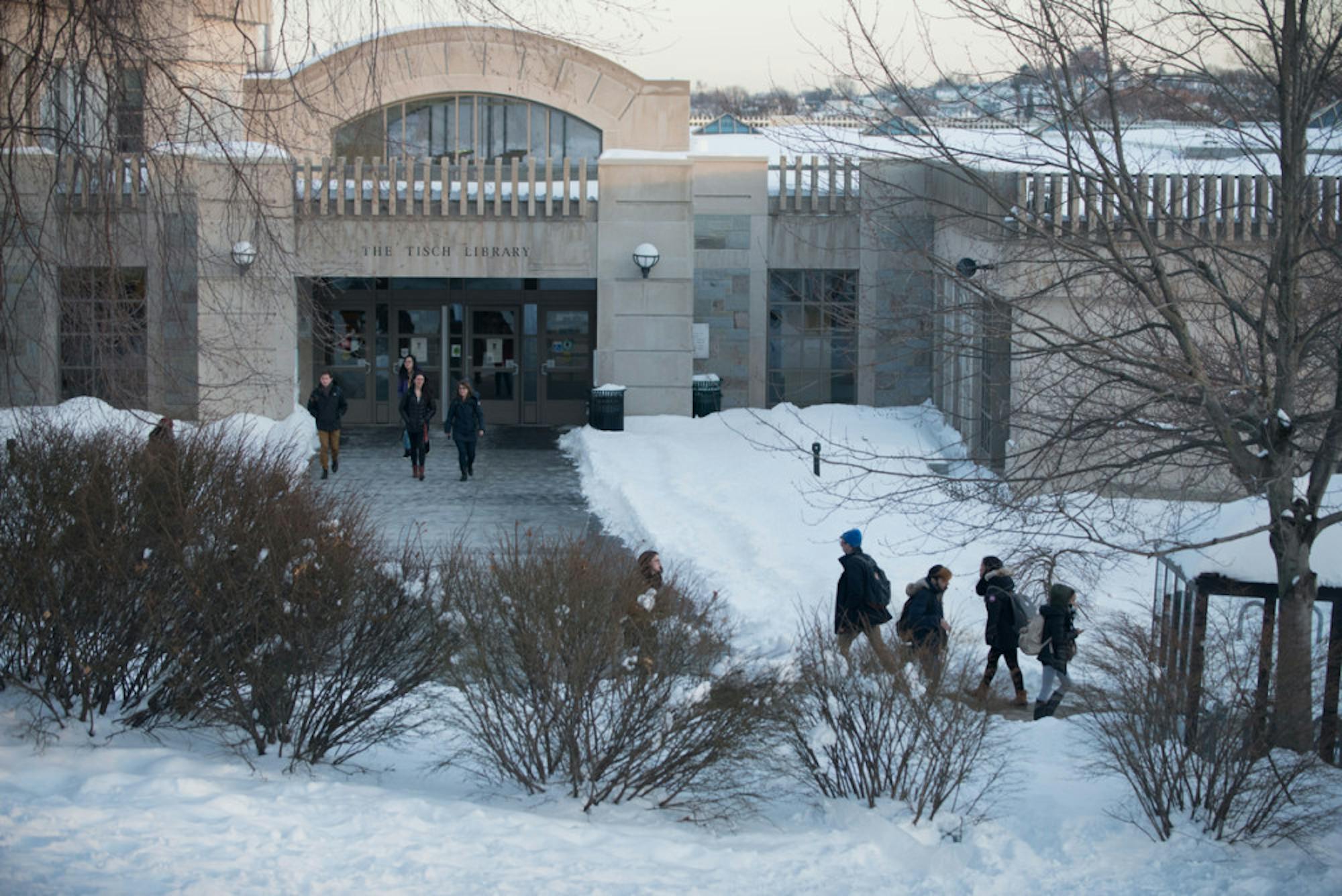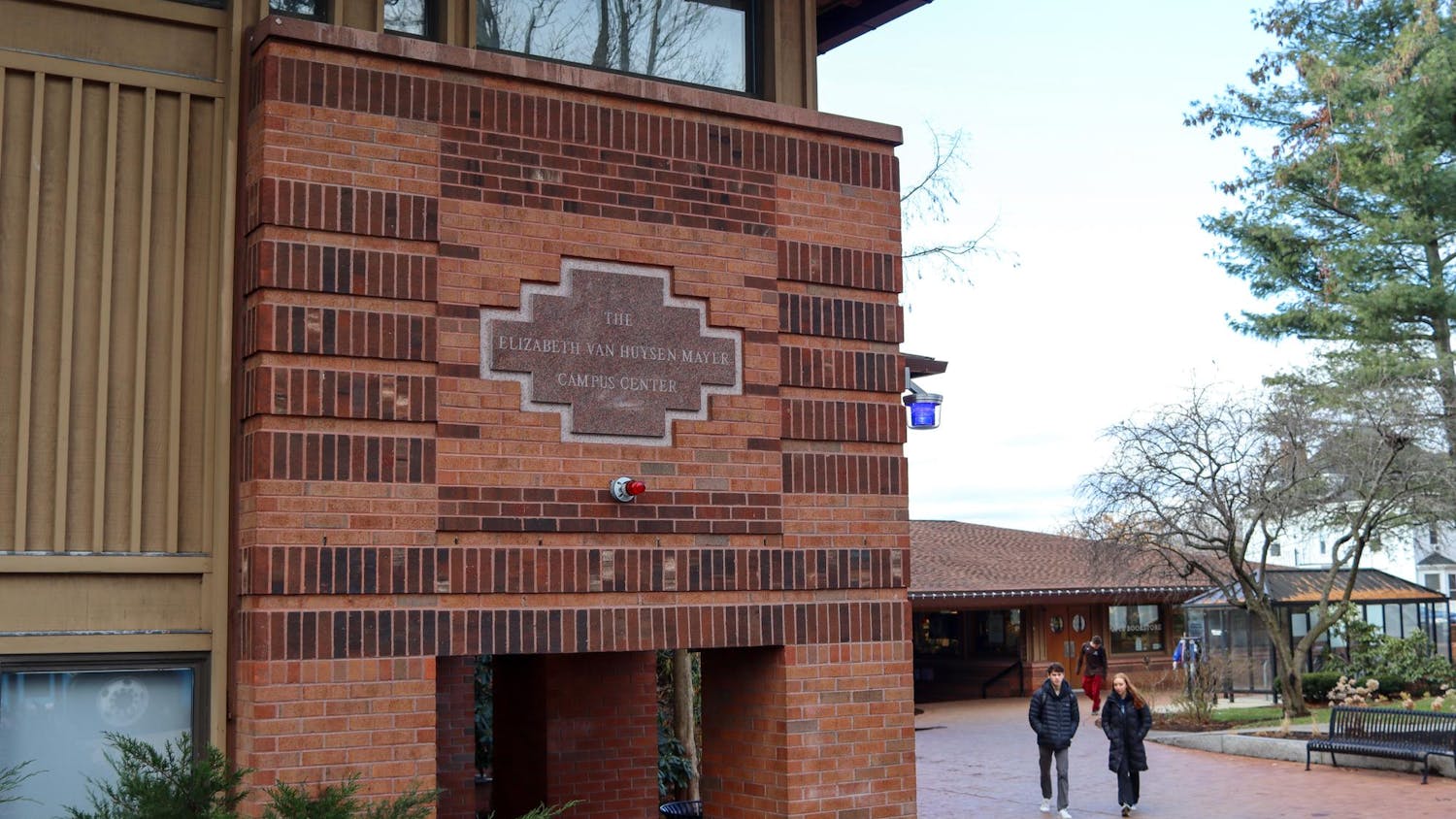2013 to 2014
The Class of 2013’s first year on the Hill saw changes to Tufts’ social and dining scenes, as well as student activism over the university’s sexual assault policies and practices.
Fall Gala and Winter Ball, rebranded in an effort to address alcohol-related issues at previous years’ events, had earlier start times and fewer available tickets. Meanwhile, Tufts University Police Department (TUPD) cut short the fall show of Tufts Dance Collective (TDC) due to multiple alcohol-related medical calls and unsafe and unsanitary conditions within Cohen Auditorium. Although many feared that this would mark the end of TDC, the spring show went ahead after its organizers also implemented changes.
While several Tufts social traditions were restructured, Tufts welcomed a fourth sorority, Kappa Alpha Theta, onto campus. Theta initiated 77 charter members in September.
Tufts Dining also saw several exciting additions. Former Tufts Community Union (TCU) Senators Isabella Kahhalé (LA'17) and Christie Maciejewski (LA '14) spearheaded the introduction of late night dining at the Commons Deli and Grill.Starting in January, the Commons began accepting meal swipes from 9 p.m. to 2 a.m. on Fridays and Saturdays, until rowdy and disrespectful behavior prompted the closing time to be shifted forward to 1 a.m.

The Tufts community bid farewell to a number of staff members. Associate Provost Mary Lee left Tufts after 27 years to assume the prestigious Kimitaka Kaga Professorship at the University of Tokyo’s Graduate School of Medicine and Dean of the School of Arts and Sciences Joanne Berger-Sweeney left in June to become president of Trinity College. The university also mourned the deaths of Fletcher Professor of English Emeritus Jesper Rosenmeier and Assistant Director of Career Services Donna Milmore.
In November, the Board of Trustees approved the T10 Strategic Plan, which created a framework for the university’s goals over the next 10 years. The 45-page document focused on increasing diversity initiatives through funding gap years and financial aid as well as encouraging interdisciplinary learning with programs like Bridge Professorships. In February, the Committee on Student Life announced the reversal of its December 2012 “justified departure” policy. All organizations, including Religious and Philosophical Student Organizations, would now be required to adhere to the TCU Judiciary’s non-discrimination policy.
Additionally, issues surrounding sexual assault on campus were prevalent throughout the year. In the fall, University President Anthony Monaco announced the formation of a university-wide task force on sexual misconduct prevention. In the spring, students organized the first annual It Happens Here event, which provides a space for survivors of sexual assault to share narratives.

A number of high-profile speakers visited the Hill this year. Huffington Post founder Arianna Huffington spoke about modern media at the annual Edward R. Murrow Forum, while Kenan Thompson of "Saturday Night Live" headlined the Tufts Entertainment Board’s spring comedy event. On the political front, Rwandan President Paul Kagame and the late Supreme Court Justice Antonin Scalia both sparked controversy with their visits -- about 20 students protested Scalia’s speech, the final of the Richard E. Snyder President’s Lecture series.
Within Tufts’ student politics, the TCU presidential election saw a heated contest between Andrew Núñez (LA ’15) and Robert Joseph (LA ’15). However, a website and Facebook page for “Generic Candidate” were anonymously created by Ben Kurland (LA ’15) to draw attention to what he noted were many similarities between the two platforms. After a 12-hour delay due to technical problems with TCU Election Commission’s new online voting system, Joseph was announced as the next TCU president.
2014 to 2015
Between a “Snowpocalypse,” two student sit-ins and unstoppable sports teams, 2014–2015 was a year of firsts and record-breaking events.

Tufts football won its season opener against Hamilton, breaking the team’s infamous 31-game losing streak. Attendees at the homecoming festivities crowded the field in celebration of the historic win.
Also in the fall, men’s soccer saw an unlikely run for the NCAA Div. III National Championship title. After making it through the quarterfinals and semifinals, Tufts clinched the championship against Wheaton College in a 4-2 win.
Student activism reached new heights this year, with many students joining protests in Boston in response to several deaths of black Americans at the hands of police officers nationwide. A student group, Indict Tufts, also led protests against racial oppression of black Americans, including a march from campus to the Harvard Bridge over the Charles River.

Meanwhile, Tufts Labor Coalition (TLC) responded to Tufts’ proposed changes to and downsizing of the janitorial services staff with a 33-hour sit-in at Ballou Hall and a five-day hunger strike that made local and regional headlines. TLC also protested a new 5,000-pound bronze Jumbo statue, which was donated by alumni and unveiled in April. In addition to labor issues, the debate over fossil fuel divestment was invigorated when 33 students, mostly from Tufts Climate Action (TCA), held a sit-in at Ballou Hall to protest Tufts’ investments in the fossil fuel industry.
The spring semester was significantly affected by heavy snow, which led to a record-breaking five snow days. To make up for lost class time, professors rescheduled classes on Patriot’s Day and during the first two days of reading period. This spring also saw computer science become the most popular major at Tufts, surpassing international relations as the program with the most declared majors. Professor Sol Gittleman also retired after more than 50 years at Tufts.
Several student initiatives began this year, including the production “Not Your Mother’s Monologues,” a non-ciscentric, more inclusive version of “The Vagina Monologues” (1996). TED Talk-style lectures also came to campus through the student-led launch of TEDxTufts, which gives students an opportunity to share their ideas and passions. In April, Kesha headlined Tufts’ first Spring Fling that featured exclusively female-led groups, including MisterWives and Lauren Lane.
Tufts Community Union (TCU) Senate saw a major first and a major controversy, with the first uncontested Senate presidential election in recent history leading to the election of Brian Tesser (LA '16). Earlier in the year, Senate’s budgeting and club-funding decisions came under fire when some student groups, particularly Tufts Mock Trial, learned of new limitations on travel funding from Senate’s budget.

While Greek life grew in popularity, the brothers of Pi Delta, formerly known as Alpha Epsilon Pi, disaffiliated from their national chapter in response to differing interests and values between the Tufts and national chapters. In late May, a stabbing took place inside the house of Delta Tau Delta, leading to a temporary lockdown of the Medford/Somerville campus. The stabbing incident is still under investigation.
Students saw their housing affected by Somerville’s passing of the University Accountability Ordinance. This ordinance mandates that universities in Somerville — particularly Tufts — submit a report providing students’ addresses to limit overcrowding in off-campus housing in accordance with an existing zoning ordinance. The ordinance came at a time when Tufts saw more applicants and more students choosing to attend the university, straining on-campus housing and forcing more upperclassmen to live off campus in increasingly expensive Medford and Somerville.

Several notable speakers, including the parents of Trayvon Martin, came to campus. Some student groups, especially the Pan-African Alliance and Black Student Union, criticized Hillel’s choice to invite Martin’s parents due to Hillel’s stance on Israel, among other concerns. Additionally, ABC News anchor George Stephanopoulos spoke at the Edward P. Murrow Forum and Senator Elizabeth Warren delivered the Alan D. Solomont Lecture on Citizenship and Public Service, where about a dozen students protested Warren's previous pro-Israeli statements.
2015 to 2016
The 2015–2016 academic year saw notable changes and additions to the programs and majors offered at Tufts, lively student activism and progress made on several significant building projects.
Perhaps the biggest academic news was Tufts’ announcement of the acquisition of the School of the Museum of Fine Arts (SMFA) at the end of the year. Meanwhile, the School of Arts and Sciences began to offer a Portuguese minor in the spring. It also announced a film and media studies major; an environmental studies minor focusing on food systems and nutrition; and a science, technology and society co-major and minor, which all debuted in fall 2016. On the other hand, minors in linguistics and cognitive and brain sciences were terminated in fall 2015, although they returned in spring 2017.

Tufts saw the reopening of the Collaborative Learning and Innovation Complex at 574 Boston Ave., the completion of the renovated Memorial Steps, the start of construction work on a new Central Energy Plant (CEP) and significant work completed on the Science and Engineering Complex (SEC). Construction workers, however, protested Tufts’ use of non-union workers for these projects, with the Boston Building Trades Council using billboard trucks to communicate this message.
Tufts Labor Coalition (TLC) also supported union-only hiring efforts on campus and continued to push for better labor practices for Tufts janitors. Student organizers from TLC protested outside Gifford House, at town-hall meetings and during Jumbos Days.
Other student activists continued to rally behind divestment from the fossil fuel industry. Tufts Climate Action (TCA) hosted a two-day symposium on climate change in April and demonstrated outside a Board of Trustees meeting that month. Many faculty also showed support for fossil fuel divestment through a faculty resolution passed in May.

Other activist efforts included a march organized by #TheThreePercent in conjunction with nationwide protests against racism on campus. #TheThreePercent also released a list of demands to Tufts administrators, asking for better black student and faculty representation, increases to the Africana Center's budget and more mental health resources for black students. Students for Justice in Palestine also staged several protests and actions, including the disruption of Friends of Israel’s annual Taste of Israel event, sparking a debate about the Israeli-Palestinian conflict, cultural appropriation in food and the nature of campus protests.
The university hired its first chief diversity officer, Mark Brimhall-Vargas, who had begun working as associate provost in May 2015. In the fall, Brimhall-Vargas chaired the Diversity and Inclusion Working Group and later helped start a “Diversity Dashboard” to increase transparency in diversity issues.
Several notable speakers came to campus last year, such as economist Lawrence Summers, television journalist David Gregory and activist and scholar Noam Chomsky. At the Edward P. Murrow Forum, television journalist Anderson Cooper spoke about his career and the 2016 presidential election. Congressman and civil rights activist John Lewis and political strategists David Axelrod and Beth Myers (J ’79) also came to speak on the Hill.
The Jonathan M. Tisch College of Citizenship and Public Service was renamed the Jonathan M. Tisch College of Civic Life to focus on civic engagement, after a donation from Jonathan (A ’76) and Lizzie Tisch to the college.

Several longstanding administrative, admissions and student life positions were revised throughout the year. Dean of Undergraduate Admissions Lee Coffin ended his 13-year Tufts career at the end of the year to head admissions at Dartmouth College. Director of the Institute of Global Leadership Sherman Teichman also left his role after more than three decades. In December, Director of the Experimental College Robyn Gittleman retired after 40 years. Finally, Steph Gauchel left their position as director of the Women's Center to work at the Harvard Divinity School.
Greek life organizations became increasingly popular this year, with 200 students accepting sorority bids and a potential new sorority, Alpha Gamma Delta, which ultimately did not form a chapter on campus. The fraternity Pi Rho Omega, formerly known as Sigma Phi Epsilon, disaffiliated from its national organization in January, citing differing values between the Tufts and national chapters.

Several campus safety issues came up throughout the year, including the ongoing investigation surrounding the stabbing at Delta Tau Delta’s house in May 2015. Multiple sexual assaults and acts of misconduct were reported in Tufts dorms, prompting a public university response. Finally, spring semester final exams were postponed due to bomb threats and a car fire behind Health Service.
Throughout the year, students also prepared for the 2016 presidential election, canvassing in New Hampshire, attending rallies and demonstrating at a rally held by then-presidential candidate Donald Trump in Massachusetts.
2016 to 2017
This year saw a rise in tension on campus in the aftermath of President Trump’s election, which had unmistakable parallels to the atmosphere nationwide. The effects of this reverberated throughout the rest of the school year.

One effect was a walkout and rally calling for Tufts to become a sanctuary campus in an effort to protect its undocumented students. Though never explicitly naming Tufts a sanctuary campus, Monaco pledged to support and protect undocumented students by keeping their information private from law enforcement officials and providing access to legal counsel.
Simultaneously, the Tufts Observer published an explosive article detailing hazing and sexual assault at a fraternity in November. The piece sparked calls for the abolition of Greek life at Tufts, the suspension of spring recruitment of fraternities and sororities and the issuance of nine cease-and-desist orders. One Greekorganization was dissolved and two more were suspended. Earlier in the fall, half of Alpha Omicron Pi sorority’s members dropped out after the national organization hesitated to admit a transgender woman, and several members of Chi Omegasorority quit, citing discrimination by their own national organization. In light of this tumult, Monaco commissioned the Student Life Review Committee to assess all aspects of student life on campus.

In the second uncontested election in three years, rising senior Benya Kraus was elected Tufts Community Union (TCU) president. TCU Senate also debated controversial resolutions that called for changes to Tufts' Sexual Misconduct Policy and Title IX policies as well as divestment from four companies involved in the Israeli occupation of the Palestinian Territories.
Labor issues continued this year, as janitors threatened to strike in the run-up to the deadline of their contract renegotiations, workers in Facilities Services filed a complaint against Tufts with the National Labor Review Board, part-time faculty rallied support for their contract renegotiation with Tufts and graduate students authorized a vote to unionize.
Tufts continued its integration of the School of the Museum of Fine Arts (SMFA) after its acquisition last summer. SMFA students went through Tufts orientation, the admissions of both schools were combined and SMFA students switched to a need-based, rather than merit-based, financial aid system.
In September, South Hall was renamed Harleston Hall in honor of Bernard Harleston, former dean of the faculty of arts and sciences and the first African-American tenure-track professor at Tufts. Construction on the Central Energy Plant and the Science and Engineering Complex (SEC) continued while it was announced the Boston Avenue/College Avenue intersection would be redesigned for pedestrian safety. Brown and Brew Coffee House will be closing in August, to be replaced by a cafe in the SEC.
The Residential Strategies Working Group finished its work and recommended converting Tufts-owned wood-framed houses, currently used as office space and faculty housing, into student housing to ease tensions with Tufts’ neighbors.

This year, Tufts saw a slew of interesting and sometimes controversial visitors, including former Secretary of State John Kerry, "NBC Nightly News" anchor Lester Holt, Senator Tim Kaine, former advisor to President Barack Obama David Axelrod, former host of "Meet the Press" David Gregory, who also taught a class through the Jonathan M. Tisch College of Civic Life in the fall, academic Judith Butler, NPR’s Mara Liasson, former Governor of New Mexico Bill Richardson, Chief of Staff to President George W. Bush Andrew Card, President of CBS News David Rhodes and Massachusetts Governor Charlie Baker, whose presence provoked a protest and walkout. In March, actor and Cambridge native Matt Damon made two surprise appearances at the Steve Tisch Sports and Fitness Center.
Tufts also said goodbye to several members of the faculty and staff, including Mark Brimhall Vargas, who left his post as chief diversity officer to become vice president for diversity, equity and inclusion at Brandeis University. LGBT Center Director Nino Testa and Latino Center Director Rubén Stern both left Tufts, as did Vice President of Operations Lynda Snyder, who retired.
The year rounded out with Spring Fling performances from an all-black lineup of artists. The show was successful despite a last-minute cancellation from headliner T-Pain.
Another end-of-year upset took the form of a leak of confidential information by a group called TuftsLeaks. The information included salary data for faculty, staff and students, and the investigation is ongoing.
The leaks were done in the name of transparency in university spending. This was a common theme of this year as tuition, fees and other expenses topped $70,000. Yearly tuition increases prompted the creation of a #HaltTheHike campaign by Tufts Student Action, who demanded transparency and a freeze on increases.

In happier news, Tufts celebrated its first Indigenous People's Day in October, and the men's soccer team closed out its season with its second NCAA Championship win in three years.
CORRECTION: A previous version of this article referred to Steph Gauchel as her. However, Gauchel actually uses they pronouns. The article has been updated to reflect this change. The Daily regrets this error.






